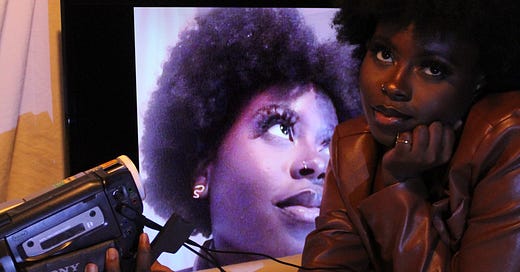Hot Take: It’s time to hand the mic to your junior employees
Karren Lovejoy on reversing the top-down flow of ideas
CHERRY ON TOP 🍒 is our monthly newsletter exploring the ins and outs of everything that modern businesses need to truly shine. We dive into topics that live at the intersection of our two companies – ORCHARD STREET, a seed fund & DALY, a comms+ agency – as both help founders get the best ideas out into the world, through outstanding operations, comms, and culture-building.Ally here! A company’s leadership could tell you a million times over about how they empower the youngest members of their team. But have you ever heard what that experience feels like directly from the junior employees themselves?
In this issue, we pass the mic to Junior Comms Associate, Karren Lovejoy, for a piece that’s all about the importance of centering junior employees’ voices—and how she found her own.
I love how this issue turns the typical logic of why you should seek out growth opportunities for your junior employees on its head. It’s not just about building up their confidence—though that is an incredibly positive outcome that undoubtedly comes from giving them a platform in which to share their ideas, learn, and grow.
It’s equally about remembering that great ideas are born of more than just years of professional experience. We each have wells of creativity, inspiration, and knowledge that go far beyond our years in the industry, title, and professional background.
The best ideas can come from the most surprising places, if you’re only willing to look (and listen).
Karren: After entering the workforce alongside my newly-graduated friends in 2022, we all agreed that we felt quite small, naive, and lost. We were grappling with a new sense of responsibility in a world where everyone seemed to know a lot more than us. In reality, we each carried a plethora of experiences that shaped the way we see the world, our jobs, and most importantly, ourselves.
Finding and strengthening my own voice has been a lifelong journey of ups and downs—one that I’m still on. But each moment that I've been given the floor to share my opinions has helped build up the confidence I need to continue to speak up. Now, just two years later, I’m starting to see the power and value of my voice—and those of my junior peers—and why organizations should welcome and embrace them.
But to understand how I found the confidence to speak up in the workplace, you have to understand the journey I’ve taken to get there, which all starts with a childhood insult.
~~~
Having grown up in Ghana, I am no stranger to insults. It is the culture’s love language. Any West African will tell you that within the family unit, descriptive name-calling, witty insults, intense sarcasm, and speaking your mind is the law of the land. I was so tiny as a kid that my grandma once famously said, “you look like someone drew the number 1 with a pencil, and erased a little bit of it.”
But perhaps my favorite insult was being called “too know.”
In Ghana, a ‘too know” (or mpaninsem in my language, Twi) is someone who has too much to say all the time. Too opinionated, too inquisitive, too talkative. Not to be confused with a “know-it-all” in English, a “too know” is a “wants-to-know-it-all.” And I did. My confident, “too know” 11-year-old self had a lot of thoughts and questions about everything, and demanded to be heard (I was even hit with a cane at my strict Christian elementary school for being too talkative). Still, my confidence could not be broken. The world was a stage and my hands held a mic.
That was: until I moved to the United States. Going from the buzzing city of Accra, Ghana, to a rural town of central Massachusetts—in middle school of all times—was an abysmal culture shock. I had never seen anything like an American middle school, and they had never seen anything like me.
Being curious, asking questions, and speaking up resulted in a slew of stares, judgment, laughter, and bizarre questions: Who is she, where did she come from, and why does she sound like that? There was something different about these insults that I couldn’t quite understand. I went from being in on the joke, to being the butt of the joke.
I quickly learned that in order to blend in, I had to shut up. I withdrew into myself and soon enough, I was “the quiet girl.” Little did they know.
It wasn’t until I started college that I regained that former part of myself again. In a liberal arts campus environment filled with people from all walks of life, I started to let my voice be heard. I still never raised my hand in a classroom, but I picked up a mic—this time, a physical one. I started recording videos about my life and posting them on YouTube, created a podcast that I hosted all alone, and built a cozy online community of girls who share similar experiences, values, and passions. I was finally letting my inner mpaninsem shine again.
~~~
When I graduated college and entered corporate America, I made the mistake of thinking my burgeoning openness would be widely accepted, and better yet, encouraged. But instead, my first corporate job felt like middle school all over again: no questioning why things are done the way they are, no giving my opinions on any subject matter, and no speaking up.
Still, I persisted in my curiosity, doing my best to stand my ground no matter where that got me. And with persistence, I started to see some positive outcomes.
In that early corporate role, I gathered up the courage to initiate a team meeting about the way conversations were being had, and feedback was being given, which resulted in the whole team taking a course on non-violent communication. Although I can’t say that I felt an immediate change, I was proud that I was able to facilitate this team reflection.
When I then decided to take on a role as a PR freelancer with only 7 months of prior agency experience, I knew I’d have to do the most speaking up I had ever done. In one instance, I suggested to my client that they place the remaining copies of a small coffee table book—one they had designed for internal purposes only—at the local bookstore down the street. They laughed it off. Even still, I had a feeling there was something to the idea, so I grabbed the stack of books and headed down the street to ask the owner if she’d be interested in stocking them. Two days later, we received a call from the bookstore: the books were sold out, and they needed more copies (and they had people calling in specifically for those books).
Much more recently, I was listening to one of my favorite podcasts when I heard the hosts mention that they loved a product from a client of mine. I reached out to my senior manager and asked excitedly if we could send them some free products. To my surprise, they championed this idea and the podcast hosts were extremely appreciative of the gesture.
I did all of this speaking up in the workplace mostly on my own—and am grateful that my inner mpaninsem has stuck around through thick and thin. But, imagine if my fellow junior employees were also empowered to speak up? Imagine how much richer and varied organizations could be if we all did.
So my hot take? Ask your junior team for ideas. Ask them for their opinions, questions, and thoughts. It may seem like they don’t know much in a world where experience is everything, but they do know, and they want to know. Hand them the mic. There is a little “too know” deep down inside everyone, and its voice wants to be heard. I think we should all start listening.
The Cherry on Top: Your vulnerability is your superpower. By drawing from your own experiences when relating to colleagues, you can unlock new forms of connection—and new sources of inspiration to encourage each other to speak up.
___
Karren Lovejoy is a Junior Comms Associate at Daly, a content creator, and the writer behind Have You Died Today? on Substack!








